As a soccer coach, you might be wondering when your players will hit their peak.
So let me answer the question of when do soccer players peak?

In general, professional soccer players’ peak age is between 25 and 28 years old. However, this does not mean that all players’ peak or optimal age is the same as many factors can affect when a player reaches their peak performance, such as position, training, nutrition, injuries, and genetics.
As peak age can vary due to the physical and physiological demands of the modern game, in this blog post I will cover the following age-related topics within soccer
- How can you tell when a soccer player has peaked
- What is the average age for the most successful teams
- How can players stay in good shape as they get older
- At what age do soccer players retire?
HOW CAN YOU TELL WHEN A SOCCER PLAYER HAS PEAKED
You can never predict the future so it is impossible to determine if a player will continue to progress but there are two things that together, will help give you a good idea if a player has reached or is reaching the peak of their powers.
- Observation
- Statistics
Observation
Consistently watching an individual player week in week out will help you get a good feel of how the player is playing.
Simply watching highlights will not allow you to make a fair judgment on a player’s all-around game in a match.
Statistics
If you have access to statistical evidence of player performances, your initial observational judgment can be backed-up or contradicted with numbers.
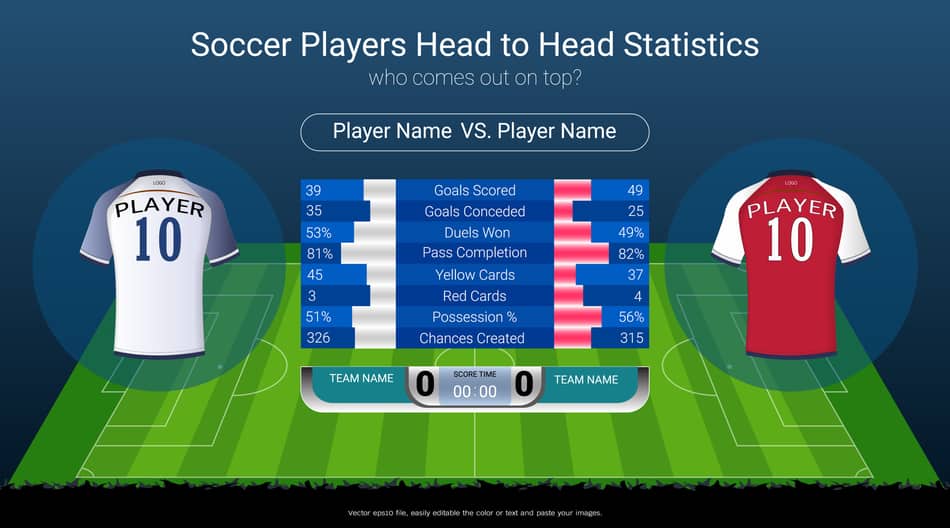
You can use performance analysis to look at how a player is performing over an extended period, not just in one match.
By comparing season by season statistical evidence, you will be able to see if a player is progressing or if there is a substantial drop-off in performances.
The reason we should use the two is that both methods, in isolation, have their flaws.
Observing a player creates a subjective view in which another observer might have a different opinion.
Whilst, statistical evidence does not tell the whole story, for example, a striker might have a high scoring conversion rate but if they are not playing well within the team, their overall impact on the game might be low.
What to look for
Things to look out for may include:
- Level of consistent performances over a full season
- How well a player is working within the team’s system
- The number of goals they are scoring (if they are a striker)
- The number of assists (depending on the players’ playing position)
- Their level of fitness and injury-proneness
- How well they are performing in training
WHAT IS THE AVERAGE AGE FOR THE MOST SUCCESSFUL TEAMS
The average squad age of the winning teams across the 19 World Cup finals, from 1930 to 2010, was 27.5 years.
Whilst at the 2014 World Cup in Brazil, the mean age for players participating in the early matches was also 27.5 years
Out of the 32 national teams that qualified for the 2018 World Cup Finals, only 9 teams had an average age of 29 plus or 26 or younger.
None of the teams were younger than 25 or older than 30 years old whilst the winners, France, had an average age of 26.
For the 2019 Champions League winners, Liverpool had an average age of 27 while Europa League winner Chelsea’s average age was 28.3 years old!
For the top clubs in Europe, the average team age is:

WHY DO PLAYERS DECLINE WITH AGE?
As we age, our bodies go through changes that can impact our physical performance.
Some of the common age-related changes that occur in athletes are:
- Decreased speed
- Decrease in agility
- Decrease in explosive power
- Increased risk of injuries
All of these changes can have a negative impact on a player’s performance.
AT WHAT AGE DO SOCCER PLAYERS DECLINE?
Like all athletes, a player’s peak performance cannot last forever and at some point, a player’s physical capabilities will eventually decline.
Despite several players over the age of 30 receiving individual honours, for their performances, such as:
- Luka Modric (31) – Best midfield player in the Spanish Primera Liga, 2016
- Cristiano Ronaldo (35) – Euro 2020 Golden Boot Award
It is clear to see that both players have adapted their game and their style of play is not the same as when they were in their early 20s.
For example, if you were to watch videos of a young Ronaldo, you would see a flying winger.
However, Ronaldo reinvented himself as a striker and now plays as a target man instead of making continued bursts up and down the wings.
Whilst older players can sometimes compensate for the loss of physical attributes with the experience gained over their career, the frequency of games an older player can participate in diminishes.
A study that analysed players from La Liga during the 2017- 2018 season showed that for players over 30, the following stats decreased between 5-10%
- Distance covered
- Number of high-intensity efforts or sprints
- Maximum speed reached decreased significantly
So it appears that generally after the age of 30, most players seem to start to decline.
HOW CAN SOCCER PLAYERS STAY IN PEAK CONDITION FOR LONGER?
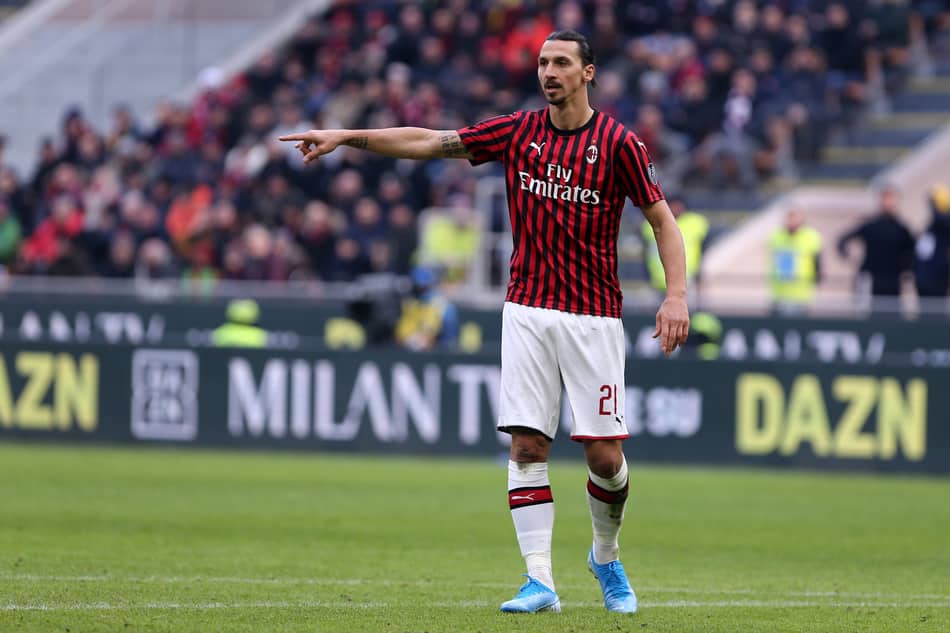
At some point in any elite athletes’ career, the time will come when certain physical actions will start to become more difficult to execute due to the natural aging process.
So here are some guidelines on how you can prolong a players’ playing career and perhaps peak or near peak performance longer, before the inevitable age performance curve is set on the downward trail.
One way to extend a player’s career is by carefully managing their training load.
In the past, it was thought that players needed to train as hard as possible to maintain their performance. However, in the modern game, recent research has shown that too much training can lead to a decrease in performance.
It is now known that players need to strike a balance between training and recovery to perform at their best.
Overtraining can lead to a decline in performance, so players need to listen to their bodies and take a break when they feel they need it.
Another way to prolong a career is by playing fewer games.
In the past, it was common for players to compete in 60 or more games per season.
However, with the winter break for many teams in Europe, the season can be broken up into two with a short recovery period in the middle of the season
This provides players a short period of active recovery and a time for specific training, that can not be done in between games which are taking place every 3 to 4 days.
The result of this may be a decrease in injuries throughout a player’s career.
The consequence of fewer injuries may help a player stay in peak condition for longer.
It is important to remember that every player is different and will experience the aging process differently.
AT WHAT AGE DO SOCCER PLAYERS RETIRE?
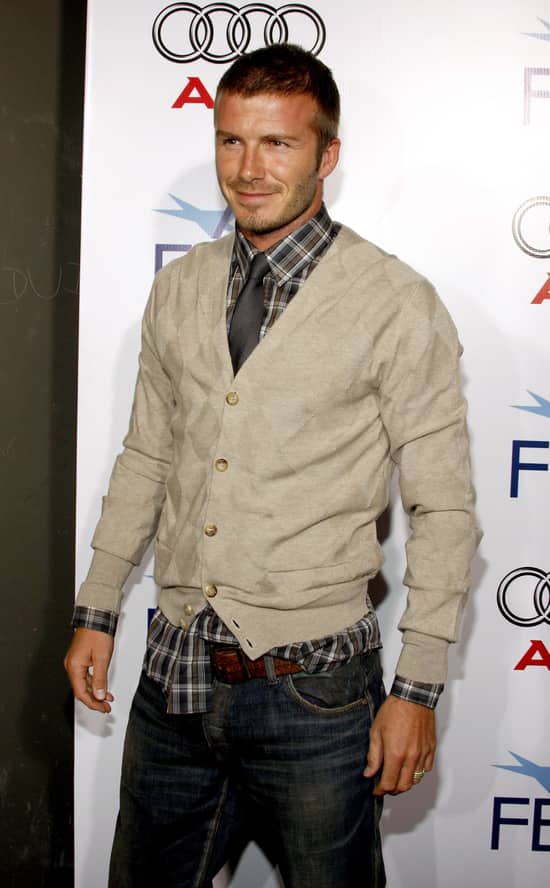
The average retirement age for a professional soccer player is 35.
However, some players continue playing into their 40s, while others retire in their early 30s due to injuries or other factors.
There is no set age at which all players must retire, and it is ultimately up to the individual player to decide when they are no longer able to compete at a high level.
Some of the greatest players in history, such as Pelé and Diego Maradona, retired relatively young while others, like Ryan Giggs and goalkeeper Gianluca Buffon, played into their 40s.
The decision of when to retire is a personal one.
Here are some other frequently asked questions regarding age-related issues in soccer:
- Oldest football players
- Average Career length of a soccer player
- The peak age for a goalkeeper
OLDEST FOOTBALL PLAYERS
The oldest footballer still currently playing, at the age of 54, is Japanese player Kazuyoshi Miura.
Kazuyoshi Miura recently left Yokohama FC to play on loan for Suzuki Point Getters, a club managed by his older brother.
Although no one would argue that he is far beyond his peak, Miuraś love and passion for the game has just kept him going.
Other players who have played at the highest level at the age of 36 or older include:
- Cristiano Ronaldo
- Zlatan Ibrahimovic
- Clarence Seedorf
- Ryan Giggs
AVERAGE CAREER LENGTH FOR A SOCCER PLAYER
The average career length of a professional soccer player is around eight years.
This is a relatively short career, especially when compared to other professions.
Now I am sure that you can think of many players who have played for 15 years and some players who have even played that long at the top level, such as the Premier League.
For example, Ryan Giggs had a playing career of over 20 years with Manchester United before his retirement in 2014 whilst Gianluca Buffon, who played mainly in Serie A, is another one whose playing career lasted for over 20 years.
However, this is not a consistent trend amongst professional soccer players.
Each year there are hundreds, if not thousands, of players who leave the sport due to various reasons:
- Players released by the football clubs
- Forced retirement through injury
- Too old to continue playing
HOW DO TRAINING AND EXPERIENCE AFFECT A PLAYER’S PEAK AGE?
For coaches, understanding how training and experience can affect when a player reaches their peak age is important for two reasons.
- It can help you make more informed decisions about when to bring young players up to the first team or give them more playing time
- Influence a players training load
- It can provide some insight into how long a player may be able to perform at their best
Effects of Training on Peak Age for Soccer players
The type of training a player undergoes can also affect when they reach their peak age.
It is important that the correct type of training, along with the right load, is performed at the most agreeable time of a player’s physical timeline.
The quality of training professional soccer players receive is crucial to their development.
Whether this is to improve technique or increase physical performance.
You only have to look at clubs such as Borussia Dortmund or Ajax who pride themselves on developing talent and have produced a stream of top-class players over the years, such as:
- Dennis Bergkamp
- Edgar Davids
- Clarence Seedorf
- Mathias DeLight
- Patrik Kluivert
- Cristian Pulisic
- Jadon Sancho
The list could go on.
Although these players were not at their optimal or peak age when
Would these players have become top-class players if they did not receive the same training and in the same environment.
With regards to the physical aspect, I remember as a 17-year-old playing in the first team at National League level, struggling to last a full game due to muscle cramps.
It wasn’t until I was a little older, after working specifically on my aerobic endurance, that I was at the level needed to start week in week out.
So whilst my explosive power was already relatively high and continued to improve, my aerobic endurance took a little while to build up.
So the trick is, as a coach, is to apply the correct training strategies that are required for each stage of development and to also ensure that the player’s training load is not too much or vice versa.
How does experience affect a player’s peak years of performance?
Whilst peak age varies widely among individual elite athletes, the reason that the peak age range is predominately between 27 and 28 may not necessarily be due to the physical capabilities alone.
The knowledge gained through experience over several years of playing regularly may be key.
So in fact, the reason that on average the peak age ranges from 25 to 28 could be that by that age, players have played, trained, practiced, and therefore learned enough to start performing at their highest level consistently.
This would seem to fit into Malcolm Gladwell’s findings, in his famous book “Outliers”, in which Mr. Gladwell found that to reach the mastery stage of any skill, an individual needs to practice for 10,000 hours.
If you consider that an elite soccer player will start to play adults football around the age of 17-18, this would mean that they reach mastery level around 8-10 years later at the age of 25-28.
This would imply that professional soccer players need to spend roughly 8-10 years of deep practice to arrive at their peak or maximum performance level.
THE PEAK AGE FOR A GOALKEEPER
It’s been believed for many years that a goalkeeper’s peak performance age is older than an outfield player.
Previous keepers such as David Seaman, Edwin Van Der Sar, and Gianluigi Buffon all played well into their 30s.
Edwin Van Der Sar won his second Champions League medal 13 years after his first, at the age of 37
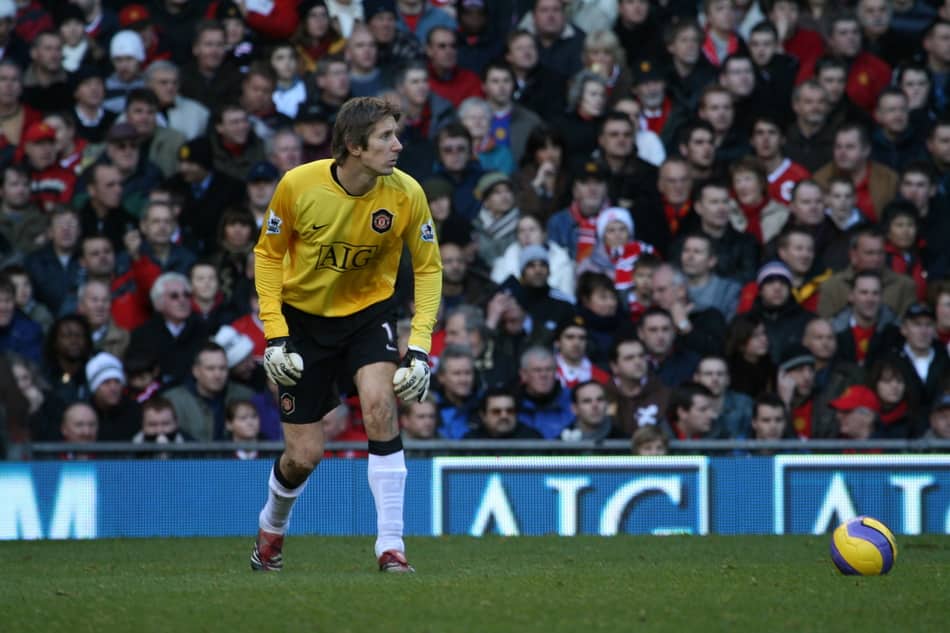
With less ground to cover it seems logical that goalkeepers can play in their prime for much longer thus their predicted peak age range would increase.
Nevertheless, this might not be the case.
Although there are a few keepers, such as Hugo Lloris (Tottenham Hotspur), for one, who are still playing at the top of their game in their mid-thirties, there have been plenty of other keepers who were deemed not good enough once they reached the 30-year-old mark, such as Joe Hart (Manchester City) and Iker Casillas (Real Madrid).
Also, statistical evidence, over 5 years, has shown that the most common age for goalkeeping appearances in the English Premier League is 28.
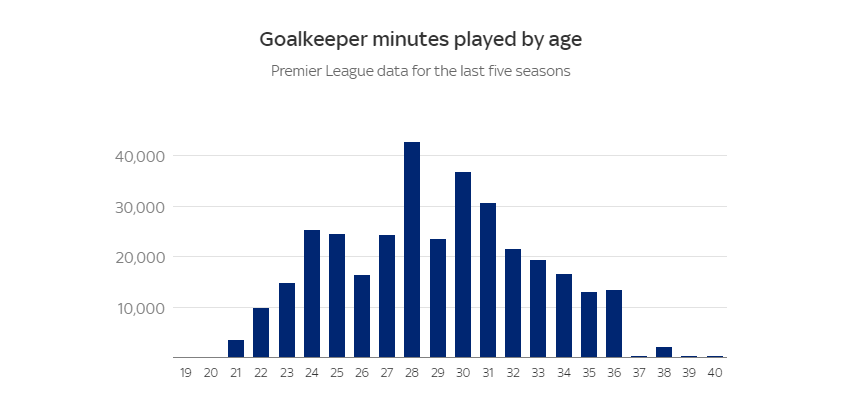
Whilst this does not prove that the optimal age is 28 as appearances depend on which players are available within each club, it may suggest that coaches and managers are looking towards goalkeepers in their mid-twenties as more suitable for the task required for the team’s goalkeeper.
But why could this be?
Without going into too much detail, as this is another subject altogether, the answer could be due to the evolving role that goalkeepers have experienced over several years.
Goalkeepers are more involved in the team’s build-up play and therefore are having to become more like outfield players on top of their goalkeeping duties in today’s modern game.
Don’t forget to check out our latest blog posts.
